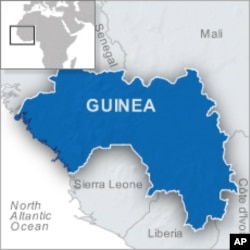Elections officials in Guinea say the West African state is not ready to hold the second round of presidential elections that was scheduled for September 19 and the planned vote has been postponed. Events in Guinea, including clashes that broke out between supporters of rival candidates, have raised questions about whether the country is calm enough for elections to proceed.
Once again, the presidential run-off in Guinea has been postponed. El Haj Boubacar Diallo, of Guinea's Electoral commission, says one of the main reasons is that voting materials are missing. "Technically the date of the 19th wouldn't work for the second round of the elections. Why? The voting cards we printed will not arrive until the night of September 18th," he said.
Also, in the last week, clashes between rival supporters left one person dead and injured 50 others.
Guinea's interim President General Sekouba Konate said Wednesday that he fears the republic is in danger because of political and ethnic divisions.
He's asked Burkina Faso President Blaise Compaore to facilitate discussions among those involved in Guinea's transition to democracy.
The election will pit former prime minister Cellou Dalein Diallo against opposition leader Alpha Conde.
Guinea's military leaders say this election will be the country's first free and fair vote since independence from France in 1958.
Although passions are running high, coffee vendor Abdoulaye Daffe offers these words of advice. "We are all parents, we should know how to protect our future. If you are for someone, you support them as you like but without provoking the others," he said.
The delay is seen as a victory for Conde, whose campaign director, Makale Traore, says it was necessary.
"We don't have a problem with the date, it's not a question of election date. What's important today is that the RPG wants to organize for the first time in the history of our country elections that are transparent," said Traore.
Conde's rival, frontrunner Diallo, has insisted that the second round take place as planned. "We have all fought for the Guineans to be able to exercise their right to choose their leaders. Going into a competition, we should accept the fact that we might also lose," he said.
In a recent interview, Assistant Secretary of State William Fitzgerald urged calm. "If there's violence, that is just the wrong signal that Guinea wants to send to the international community. Now is the time for these two candidates, and we don't care who wins, to put their best platform forward and convince the Guinean people to let these elections take place," he said.
In a recent visit to Washington, Guinea's Foreign Minister Bakary Fofana said his country faces challenges but foremost is allowing democratization to take place.
But he said this is not the only challenge. "The other big challenge for the next government is how to exploit Guinea's natural resources [iron, diamond, uranium, gas] in order to make the country a growing point that will benefit not only its citizens but also the whole region," said Fofana.
Election observers say June's first round of voting was generally free and fair, but nearly all the candidates complained of irregularities. In that round, 44 percent of the votes went to Diallo and 18 percent to Conde. The poll is meant to complete a transition to democracy and could end decades of authoritarian rule in Guinea.




